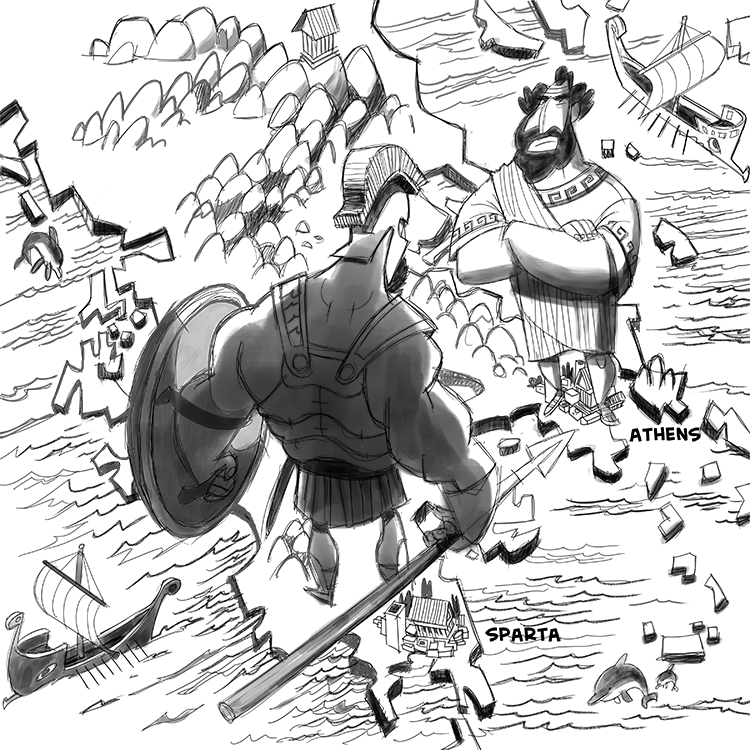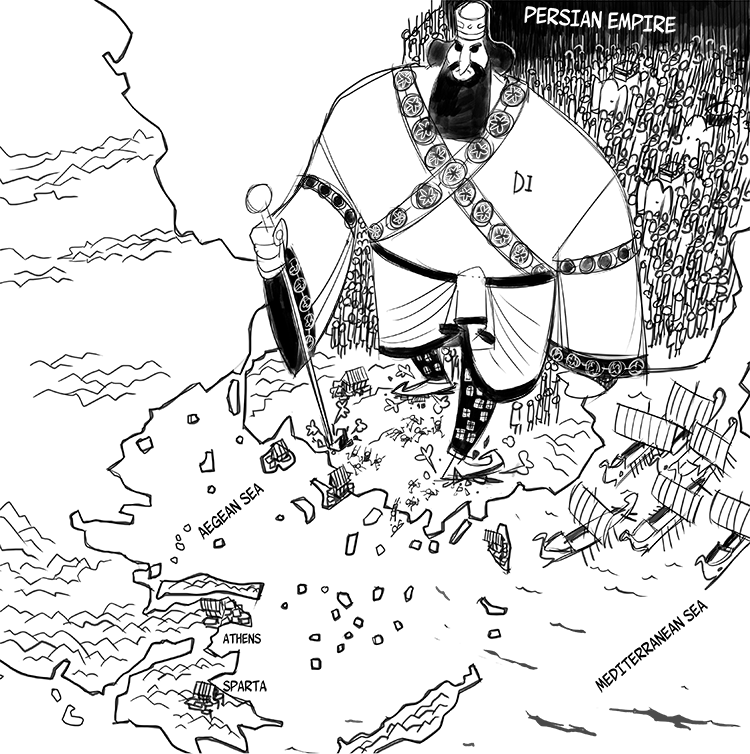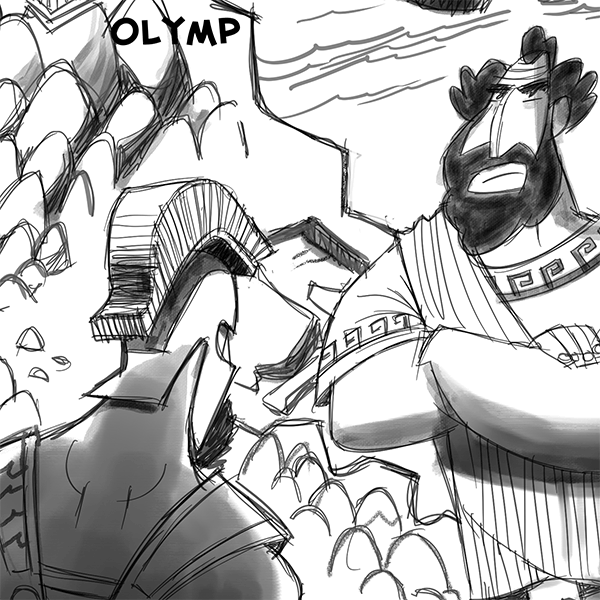Whether it’s the Red Sox vs. Yankees, Brazil vs. Argentina, or Ali vs. Frazier, everyone loves a good rivalry.
However, while most modern rivalries exist in the world of sports, in the ancient world, they would often involve much more. Rival cities, or leaders, would fight for power and control, and this often meant war and destruction.
Of all the ancient rivalries, perhaps the most famous, and most influential, was that between Athens and Sparta. The two dominant cities of ancient Greece, tensions were always high between them. And while they avoided war for most of their history, their differences eventually pushed them to conflict.
The story of the rivalry between Athens and Greece helps us better understand this world, as well as what eventually led it to unravel.

Why Did Athens and Sparta Fight?
During the Classical Era, (c. 600-c.300 BC), Greece was made up of competing city-states, known in Greek as a polis. Many of these were found on mainland Greece, the territory we now recognize as modern Greece. But there were many more.
There were Greek cities as far west as Sicily in modern Italy, and also in what is now the nation of Turkey. To expand their power and influence, cities would make alliances with other cities, often in order to wage war.
This meant that Greek cities were often in conflict with one another. It wasn’t just Athens and Sparta. But differences between them, as well as their proximity to one another, made fighting between Athens and Sparta not only frequent but also devastating.
So, why did Athens and Sparta hate each other so much?
Cultural Differences
Part of the reason for the rift between Athens and Sparta was that they were technically two different cultures. The Athenians were part of a group known as the Ionian Greeks whereas the Spartans were Dorians. The names come from the dialect of Greek they spoke.
Yes, they could understand one another, but the differences in language separated them and turned them into natural rivals.
However, while language served as the root of their mutual hatred, in the end it was political differences that drove them to war.
To put it simply, by the 5th century BC, Athens wanted to become a superpower with control or influence over the rest of the Greek world. But Sparta, which preferred to be left alone, wanted none of this, so it went to war to stop Athens from becoming too powerful.
Athens and Sparta: Two Very Different Cities
Athens and Sparta had such different ambitions largely because they were two very different cities.
Located on the Peloponnese, Sparta was an isolated city-state. It had all the resources it needed nearby, and it used war and a system of slavery to uphold its status, as well as its control over smaller cities nearby.
Athens, on the other hand, was situated in the region of Attica, which was much smaller and had far fewer resources and also operated as a democracy.
Therefore, for Athens to survive and grow, it had to develop relations with other lands and use them as trade partners. This inevitably made Athens far more expansionary than its rival Sparta, which really just wanted to be left alone.
Of course, Athens was free to expand without bothering Sparta. But because the two cities were so close to one another, any growth in Athenian influence could limit Spartan independence, which was simply unacceptable.
These core differences made it so that Athens and Sparta were almost never friends. But their hatred for one another was paused when danger emerged from far away. Yet this brief moment of friendship would not last, and partly brought on the war that brought both cities to their knees.

Rivalry On Pause: The Greco-Persian Wars
In around 490 BC, the Persian king Darius I decided to invade Greece with a massive army. He was especially interested in Athens, for the city had helped fuel a rebellion within Persia during the previous decade.
Recognizing it stood little chance of defeating Persia on its own, and also seeing that Darius wanted to squash the entire Greek world, Athens appealed to other Greek cities for help, including its rival Sparta.
Initially, the Spartans laughed in the faces of the Athenians. Well, maybe not literally. But they refused to help. Eventually, though, they came to their senses and recognized that the Persians did indeed present a threat to Sparta, and so they joined the alliance with Athens.
This was the first time the many cities of Greece unified for a common cause, which is why it’s often called the pan-Hellenic alliance. Hellenic comes from the Greek word for Greece — Hellas.
This alliance, which included other major Greek cities such as Corinth (but not Thebes, who hated everyone and fought at first on the side of Darius), defeated the Persians not once but twice. The first time was in 490 BC and the second in 480 BC when Darius’ son, Xerxes I, tried to finish what his dad had started.
From there, Athens and Sparta became great friends, working together to create a unified, peaceful Greece that would endure the test of time and become one of the greatest civilizations the world had ever seen.
Wait a second. Not so fast….
The Rise of the The Delian League
After beating the Persians, the Spartans pretty much said, “That’s it for us. Time to go home.” The only reason they saw for this pan-Hellenic alliance was to defend Greece against the invading Persians. So, once they had been driven back a second time, this was no longer a threat, and they saw no need to remain friends with the rest of Greece.
Athens, on the other hand, didn’t quite see things this way. Instead, they wanted to keep fighting, hoping that doing so would stop the Persians from ever trying to conquer them again.
Some Greek cities agreed, and so they joined Athens to form the Delian League. This name comes from the island of Delos, where the alliance was headquartered and where it kept its money.
However, soon after forming this alliance, Athens’ true intentions became clear: they wanted to build an empire.
They moved the League’s treasury to Athens, and started doing things that had nothing to do with the Persians, mainly conquering other Greek cities.
This raised lots of eyebrows in Sparta and made it clear that war might be inevitable.
The Peloponnesian League
The Spartans were kind of loners in the Greek world. Located on the Peloponnese, the big peninsula in the south of mainland Greece, they had pretty much all they needed right at their fingertips: good farmland, access to the sea and its trade routes, and lots and lots of people to make slaves.
Yes, Sparta had slaves. In fact, they were the backbone of their society, and most of the wars Sparta fought before the 5th century BC were efforts to subjugate the cities and towns near them so that they could keep up their slave system.
All of this meant that Sparta really just wanted to be left alone. It saw no need to expand its power throughout the rest of Greece, and it most certainly did not want any other city meddling in its affairs on the Peloponnese.
In general, it wasn’t alone in thinking this way. Other cities of the Peloponnese also liked to keep to themselves. So, to protect this mutual interest, they formed what is known as the Peloponnesian League.
This group was first formed in the 6th century BC and its primary focus was to provide for the common defense of the cities of the Peloponnese. It was much different than the Delian League in that no one city was more important (though Sparta often took the lead) and also in that its membership changed frequently. For example, Sparta and Argos often fought one another, though at other moments they would team up.
One thing they could all agree on, though, was that an Athenian empire would be bad for business. So, once Athens formed the Delian League and started making moves to expand, Sparta called upon the rest of its Peloponnesian allies to try and stop them.
This created the conditions for war, which would break out shortly after the formation of the Delian League, and go on to dramatically reshape the Greek and ancient worlds.
Bringing About the End
The Peloponnesian War was the final chapter of a conflict that had been bubbling for centuries. Sparta’s victory put an end to Athenian expansion and ushered in a brief period of Spartan dominance.
But, in reality, no one won. Soon after becoming the de facto leader of the Greek world, Sparta became a target and fell to Thebes and its allies during the Boeotian Wars.
This defeat then left the Greek world vulnerable to attack, making it easy for the armies of Phillip II of Macedon to sweep in and conquer what had previously been powerful independent city-states. Once this happened, the Classical Era was over.
So, while the rivalry between Athens and Sparta kept people entertained, it also brought about a dramatic change in the ancient Greek world, opening the door for Alexander the Great and the Hellenistic Era.
Written by Matthew Jones
Illustrated by Pablo Velarde Diaz-Pache
